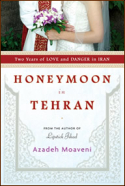Registration
You will receive an email confirming your registration.
IMGXYZ1157IMGZYXAn overwhelming majority of Iran’s population is under the age of 30, and this youth generation constantly challenges cultural norms. Furthermore, the conservative government is forced to present its religious rhetoric in new and more moderate tones to maintain a certain amount of control and legitimacy, said Azadeh Moaveni, author of Honeymoon in Tehran. In 2005, Moaveni returned to Iran to cover the rise of President Mahmoud Ahmadinejad. As she documents Ahmadinejad’s victory, Moaveni richly portrays a society too often caricatured as the heartland of militant Islam, and explores the cultural identity crisis and class frustration pitting Iran’s next generation against the Islamic system.
Elections
The same generation of young voters who demonstrated their desire for more liberal attitudes in Iran by bringing the moderate Khamenei to power earlier in this decade, supported Mahmoud Ahmadinejad out of growing economic concerns timed with their entry into the workforce.
Moaveni added that in the absence of a charismatic candidate, Iranian society has become more fragmented and politically apathetic. However, because Iranian women experienced more social freedoms under Khamenei than during Ahmadinejad’s conservative leadership, they are more likely to vote than men in the upcoming election despite the current political fragmentation.
New Measures for Social Status
Iran’s poor economy is guiding changes in social behavior. For example, extravagant wedding ceremonies are increasingly becoming a measure of social status in middle class families. At the same time, divorce rates are rising as women ask for higher dowries in their marriage contracts to be paid to them in case of divorce. Very often men cannot pay the dowries at the time of divorce and are imprisoned. Handling all the prisoners is adding complications to Iran’s ailing economy.
Progressive Family Planning
The Iranian government is taking significant steps toward promoting healthy family planning methods, such as obligatory pre-marital classes where women are lectured on healthy sexually behavior. These programs have significantly lowered Iran’s birth rates.
Culture War
The conservative Iranian government is engaged in a culture war with the liberal attitudes of its people. The government is trying to appeal to the young generation through carefully constructing venues for liberal expression, such as Islamic rock concerts. At the same time, the young generation takes advantage of these liberal openings to further challenge the conservative boundaries.
Islamist Politics
While Islamist politics appeal to a youth generation in the Arab world frustrated with their current secular governments, young Iranians who were born after the Iranian revolution are suspicious of religious governments and are more likely to favor secular attitudes and lifestyles. Therefore, while more democratic elections in the Arab world would be more likely to produce more conservative governments, the opposite would be true for Iran.
